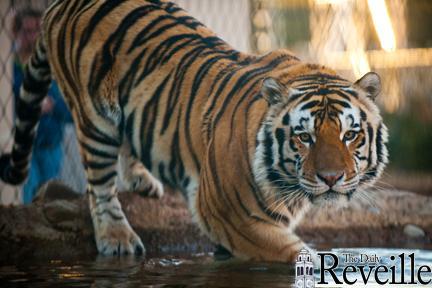Legislation has been introduced in the U.S. Congress to prohibit private possession of big cats, but Mike the Tiger lovers need not worry.
The Big Cats and Public Safety Protection Act would require anyone who currently possesses big cats, like lions or tigers, to register with the U.S. Department of Agriculture in order to keep the cats they currently own. The act also outlaws the breeding of any big cats except at zoos and research or educational institutions, as well as inbred breeding of tigers.
The main goals of the bill are to ensure big cats don’t threaten public safety, weaken global conservation efforts or endure mistreatment in poor living conditions.
This legislation would amend the Captive Wildcat Safety Act, which made it illegal to sell a big cat across state lines as a pet.
Big Cat Rescue CEO Carole Baskin said the Captive Wildcat Safety Act was the best thing to happen to big cats.
“Instead of having to turn away more than 300 unwanted big cats a year, the numbers began to drop,” Baskin said. “They have continued to drop as eight more states passed bans.”
Baskin said the Captive Wildlife Safety Act failed because it was poorly regulated and exempted USDA licenses.
Baskin noted that LSU’s mascot, Mike the Tiger, came from a facility in Indiana that lost its USDA license in 2010. The Great Cats of Indiana facility reportedly violated regulations under the Animal Welfare Act.
Ginger Guttner, School of Veterinary Medicine media relations director, said the University followed all federal regulations when acquiring Mike VI from Great Cats of Indiana in 2007. Guttner said Mike was not purchased, but instead donated to the University when he was 2 years old.
According to the bill, violators of this law could have their animals confiscated, along with any equipment used to aid in their illegal activity. Violators could also face fines up to $20,000 or be sentenced as many as five years in prison.
Congressman and bill sponsor Howard McKeon said the bill is a step forward in protecting the public and ensuring big cats reside in proper living conditions.
“No matter how many times people try to do it, wildcats such as lions, tigers, panthers, cheetahs are impossible to domesticate for personal possession and require much higher living standards compared to a domestic house cat,” McKeon said in a news release.
Despite the legislation, universities are exempt from the law, meaning Mike the Tiger is here to stay. Baskin said most informed animal lovers think it’s cruel to keep a tiger in a cage as a prop, but there is an exemption in the Big Cats and Public Safety Protection Act that would allow universities to continue their traditions of keeping big cats as mascots.
“The reason this bill can save so many big cats is because it doesn’t exempt some of the worst abusers just because they have a USDA permit,” Baskin said. Baskin said she hoped the students at LSU would speak out against a live tiger as a mascot when Mike V died in 2007.
“Maybe by the time this tiger dies there will be more humane students and no more tigers bred for LSU’s cage,” Baskin said. “Not enough [students] care.”
People for the Ethical Treatment of Animals have also spoken out against the University’s live mascot. In the aftermath of the death of Mike V, PETA sent letters to then-Chancellor Sean O’Keefe urging the University not to purchase a tiger to replace the deceased one.
Baskin spoke out against crossbred animals like Mike, who is a cross between a Bengal and Siberian tiger.
“These animals serve no conservation value,” Baskin said.
She said tigers should be rescued rather than bred for the purpose of a live mascot.
Guttner said the University has opted to continue its 76-year tradition of having a live mascot on campus.
“His safety and well-being are of the utmost importance,” Guttner said. “He receives constant care from the University’s School of Veterinary Medicine.”
Guttner added that Mike is only tiger in the country living on a college campus.
“He is beloved by visitors and the LSU community,” Guttner said. “Mike represents the spirit of the University.”
Students agree that Mike is a vital part of the campus environment.
Elementary education sophomore Mary Clark said she can’t imagine the University landscape without Mike.
“I pass by Mike every morning and say hi,” Clark said. “It is a tradition that needs to continue.”
The legislation is supported by the International Fund for Animal Welfare, Big Cat Rescue and other organizations. The bill is in the process of being considered by a congressional committee.
____
Contact Lauren Duhon at lduhon@lsureveille.com
Mike the Tiger protected from U.S. bill that would make private possession of big cats illegal
April 20, 2012




